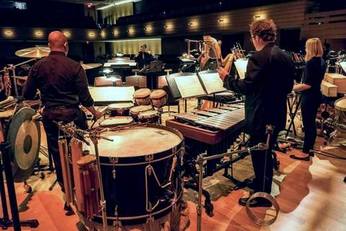 The whole kit and caboodle at Koerner Hall.
The whole kit and caboodle at Koerner Hall. And if you want things done well, you can’t go wrong with either soprano Adrianne Pieczonka or mezzo Krisztina Szabó. These two Toronto-based singers are entirely on top of their game, utterly secure in tone and technique. Szabó is a new-music specialist, and Pieczonka isn’t – yet she’s evidently unfazed by contemporary music.
Kit and caboodle? What first struck the eye upon entering Koerner Hall was the massive barrage of percussion instruments filling the stage: marimbas, drums, gongs, cymbals, bells – everything but the kitchen sink. (Or perhaps there was a kitchen sink back there somewhere. I can’t be certain.)
Aided by four percussionists – Alejandro Céspedes, Michelle Colton, Dan Morphy and Ryan Scott – and also pianist John Hess, Pieczonka and Szabó opened the program with five selections from Crumb’s American Songbooks VI and III. In Crumb’s hands, the songs blended homespun American folksiness with Asian exoticism.
“Dry Bones” was a colourful, playful clatter – full of xylophones, temple blocks and other wooden instruments, and with a ruler placed on the piano strings. But, alas, there was a balance problem, with Pieczonka and Szabó barely audible at times, even though they had microphones. (Also, it would have helped if the program book included texts of the songs.) The set ended with a bit of tub-thumping fun in “When the Saints Go Marching In.”
The other Crumb work on the program was his masterpiece of 1970, Ancient Voices of Children. Apparently, Pieczonka first sang Ancient Voices for Soundstreams 27 years ago. On this occasion, she was joined by Hess, Colton, Morphy and Scott – and also by oboist Graham Mackenzie, harpist Erica Goodman, mandolin-player Adrian Gross and musical saw-ist (?) David Hetherington. Completing the ensemble was boy-soprano Andrew Lowe.
Together, Pieczonka and this ensemble made fascinating music. Pieczonka brought a pure, lyrical simplicity to the García Lorca texts. Even with her head inside the piano, her voice projected clearly and her phrases were beautiful. And every sound the band made – whether a delicate whisper or a powerful outburst – was made an integral part of the larger structure and texture. From his position offstage, Lowe also shone, displaying fine tone and intonation.
Sandwiched between the Crumb works were two other pieces.
Romance de la luna, luna, by the Argentinean-born, Montreal-based composer Analia Llugdar, was a world premiere. The piece is like Crumb in some ways – indeed, Llugdar seemed to be trying to out-Crumb Crumb with her extended colouristic effects – yet it lacked the beguiling simplicity of the American composer’s syntax. Romance de la luna, luna was Szabó’s moment in the spotlight, and this Lorca setting displayed her full range (of emotions, as well as notes) to good effect. She was joined on the stage by Goodman, Hess, Colton, Morphy, Scott and oboist Melissa Scott, who played some truly gnarly multiphonics on her instrument.
Completing the program was a set of three Beatles songs, arranged by Luciano Berio and sung by Pieczonka. “Yesterday” had a baroque sensibility, “Michelle” was suave and sophisticated, and “Ticket to Ride” was an adventurous re-invention, with some saucy singing from Pieczonka. This was the only piece on the program that didn’t include percussionists: the players were Hess, Scott (on the oboe), Hetherington (on the cello), flutist Leslie Newman, violinist Barry Shiffman, violist Doug Perry and bassist Jeffrey Beecher.
© Colin Eatock 2015
 RSS Feed
RSS Feed

